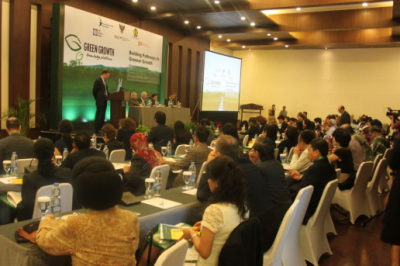Tamaro Kane, Special Assistant to the Chief Economist for Sustainable Development at the World Bank, writes about the GGKP's first Practitioners' Workshop taking place in Indonesia this week.
Many have come to acknowledge and appreciate the need for greener growth to operationalize a more sustainable development, and yet those striving for it face serious challenges in defining green growth, the strategies needed to attain it, as well as creative ways of measuring their success. It is with these issues in mind that the Green Growth Knowledge Platform organized a practitioners’ workshop focusing on the core design, implementation, and monitoring themes that pave the way towards attaining greener growth.

Building Pathways to Green Growth
Funded by the German Federal Ministry for Economic Cooperation and Development (BMZ), hosted by the Government of Indonesia, and organized by the World Bank in collaboration with GIZ, the workshop drew on both international and regional experience for a deeper and context specific dive into strategic guidance for the development of green growth strategies, important instruments for success, and practical applications of these issues through interactive case studies. The aim being to build capacity on the utilization of key applicable policy tools in developing countries and to increase south-south exchange and collaboration, interactive discussions and exercises were a core component.
With great emphasis on knowledge exchange between practitioners and experts throughout Asia, the workshop was a unique opportunity for various stakeholders to come together and share their experiences, strategies, and tools while learning from some of their counterparts who have already reached various stages in their development of a green growth agenda. While the first day of the workshop highlighted a few countries’ green growth strategies and tools as well as how they managed institutional coordination on the issue to start the debate, the second day provided participants with an opportunity to tailor the workshop to their particular interests and needs by choosing from a variety of smaller sessions built to facilitate more intimate discussions.
While the presentations of moderators helped frame the subjects and identify some of the core issues within each theme, the lively debate between government participants from Indonesia, Vietnam, Mongolia, China, India, Malaysia, the Philippines, Cambodia, Thailand, and Nepal and representatives from OECD, the World Bank, and GIZ throughout the region created a dynamic environment in which the needs, benefits, and challenges of green growth were thoroughly explored. Workshop participants all agreed with Dr. Emil Salim – first State Minister of Environment in Indonesia – when he stated that “we have been talking about green growth for years. Enough talking. What we need now is to act!” This hands-on approach was reflected throughout the workshop as participants took advantage of opportunities to engage in detailed bilateral conversations about the methods and strategies used by their counterparts and how to adapt them to their particular country.
Some sessions introduced new concepts such as decision making under uncertainty or natural capital wealth accounting for measurement while others focused on increasing guidance on the application of traditional tools to these issues such as planning and monitoring for adaptation, environmental fiscal reform, and climate finance. All of these issues have raised interest among participants to learn more about best practices and gain access to documented country experiences as guiding instruments for their own path to green growth. Pioneering the policy tools introduced and adapting them successfully is facilitated by continued exchange between counterparts in the region, and for Asia, the process of putting green growth policy into practice has just begun.

